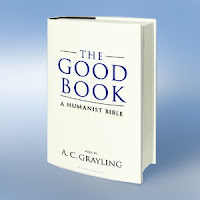 |
| (c) Walker Publishing Co. Inc. |
"The good man replied, 'For every ten words of abuse I hear from you, I will not retort one.'" --Par 1:9
While Genesis gives us a sense of awe and wonder before nature, and Wisdom provides many worthy insights, it was in the book of Parables that I first began to realize that Grayling's bible is a work I could fall in love with. The structure of this book is a tapestry of stories, many of them nestled within one another. Were I not taking notes for a review, it might be easy to have gotten lost in its layers. However, that journey is made pleasant by the charming nature of the tales.
Some of the stories are inspiring, touching, or moving; others funny - and all of them interesting and full of wisdom. The funny ones, with their anthropomorphic animal characters, are almost like watching the Looney Tunes; as when Daffy Duck gets his comeuppance thanks to his own moral shortcomings. Both cases have their roots in the likes of Aesop's Fables. Other stories have their inspiration from other works, or again showing Christian biblical reflections at times. The book's first tale of King Plousios and the beggar Penicros gives us a collection of wise precepts, but as the stories compound we move beyond mere euphemism to show through the power of myth the intimate connection between knowledge, wisdom, love, and happiness.
"The stranger said, 'In ancient Athens the philosophers thought out their best ideas walking up and down their groves; nature sobers us, and instructs us.'" --Par 13:3
Throughout Parables is a strong expression of a joy for learning, exploration, and for sharing knowledge with our fellow human beings in a fellowship of discovery. Throughout the course of several tales, these intellectual fellowships provide layers of depth to platonic friendships as well romantic, and eventually to the societal relationship. In such manner, we "carry" one another, as the stranger puts it to Charicles. But, as the timeless motto suggested, that exploration must extend to an intimate knowledge of self:
"It is well said that at the farthest point of our journeyings what we meet is ourselves..." -- Par 16:7
Along with praise of learning is another call to humility, such as Aristotle's lesson that he who says, "I do not know" has attained the half of all knowledge (Chapter 11). Other important tangents to knowledge are highlighted as well, such as the value of sincerity and patience (Ch 19, Ancient of the fig tree). Justice and charity are advised, such as in the examples of the wisdom of Judge Adasnes (Ch 8-10), the two beggars (Ch 20), and in the parable of the Chamberlain and the Goatherd (Ch 21). Integrity is also brought forth in chapter 12:
"What is the worth of mere words, if their true meanings make no difference to what a man does?" --Par 12:7
Even as we are warned about the trickery of politicians through the story of the monkey and the crocodile (Ch 17), Parables ultimately expresses a vision of seeing in our own society its best potential and daring to dream that it could be so (Ch 18).
Throughout these many stories, we come across anecdotes, allegories, and themes that are familiar to us, either in their surface form, or in important issues to which they address. Slavery is mentioned once (Par 10:18), but only as an incidental mention. One might have wished the opportunity to be used to be put it in more clear moral terms, given the common criticism of the Christian Bible on the matter. Chapter 10 is an extremely close approximation to the story of the judgment of King Solomon (Kings 3:16-28, Christian Bible). Although monarchies play central roles in many of the stories, due to the time periods that inspired them, it is clear in other stories that they exist for those in a time of democracies.
Parables' treatment of women is especially praiseworthy; advising husbands to listen to their wives (Ch 5) and in presenting women as equal participants in learning (Ch 14), travel, discovery, wisdom, and instruction (Ch 23) as well as in making their own decision in selecting their mates (Ch 7). Although homosexuality is not referenced specifically, Par 7:22 expresses that love cannot be a crime. Lastly, some familiar iconography surfaces for new purposes once again, such as in the reference of the "city on the hill" as an expression for what our society could be, and the final chapter recalling the Bodhi in which two learned sisters make a school 'under a tree'.
"...tales of wisdom, along with tales of courage and kindness, are among our best guides in life." --Par 9:1
The next part in this series will look at the next book of Grayling's bible, Concord.
NEXT PART: CONCORD
Please SUBSCRIBE to follow this series:
RSS to The Humanist Contemplative
Like DT Strain on Facebook
Follow DT Strain on Twitter
Get new-article text notices on your mobile phone:
text "follow dtstrain" to 40404

No comments:
Post a Comment